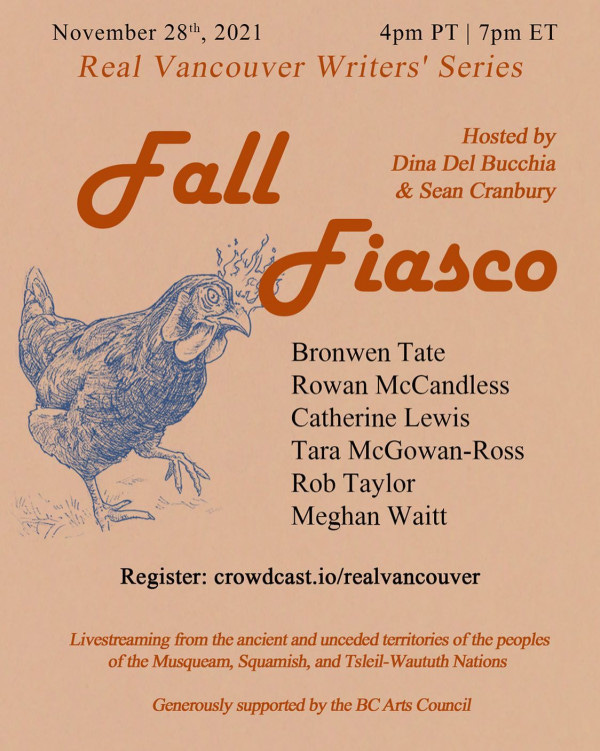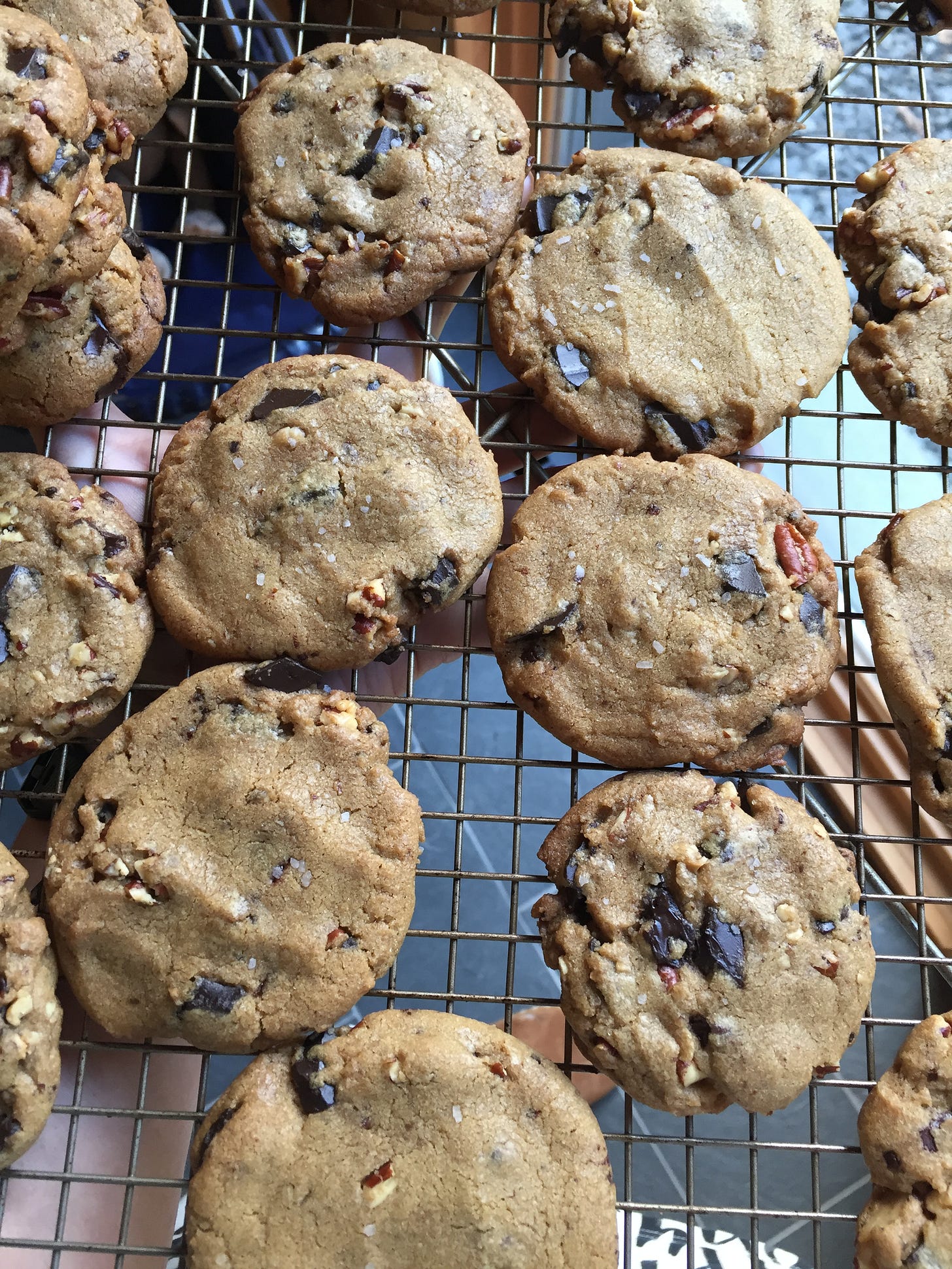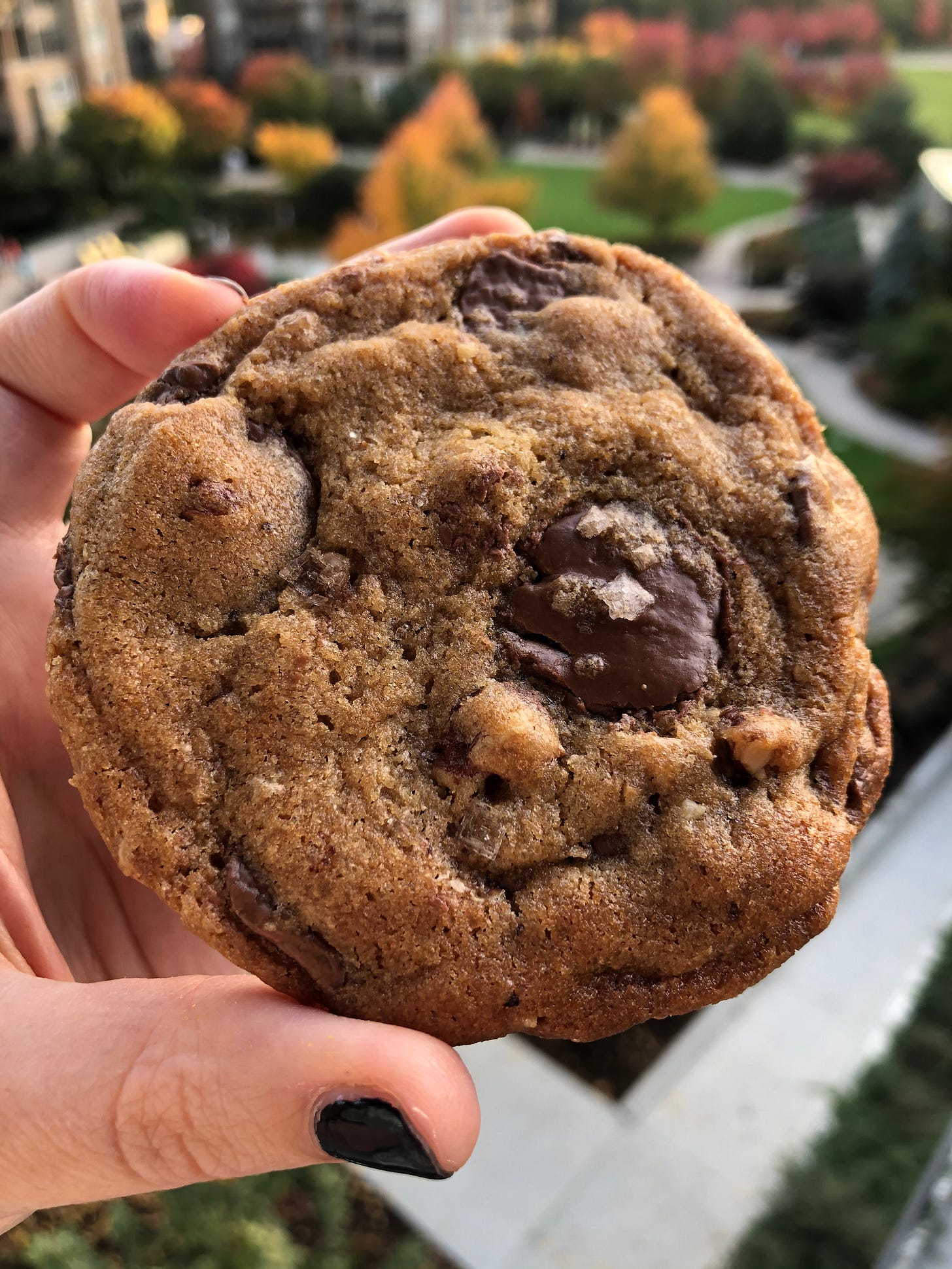Caressing the Noun
Giraffes, Lucie Brock-Broido, Hoa Nguyen, Goldenrod, Maggie Smith, Diane Seuss, Gertrude Stein, a Giveaway, Midwinter Constellation, AWP 2022, and Brown-Butter Pecan Chocolate Chunk Cookies.
Hi Friends,
Does anyone else do this? I like to collect poems that use the same nouns, especially nouns that are a bit less common. I think I started to do this deliberately when I noticed Lucie Brock-Broido’s “Giraffe” and Hoa Nguyen’s “Week of Words,” from her collection Violet Energy Ingots, both of which mention a giraffe (the same giraffe?) in a Danish zoo killed for having redundant breeding genes. I love both poems. And I love how different they are! I make these little collections in part to remind myself (and show my students) how inexhaustible the world is, how even the exact same animal or event or object can animate such richly different poem-worlds.1
I recently had the pleasure of noticing a cluster in company with the first poem in my own book: a goldenrod cluster!
Here are three goldenrod poems (in the same order as the covers above: me, Smith, Seuss)—you may need to click on the image and make it bigger to be able to read them:
Maggie Smith’s “Goldenrod”
In Maggie Smith’s “Goldenrod,” I’m struck by the distance Smith places between a thing and its name. (I might even say, between a being and their name, as Smith addresses goldenrod directly and invites a kind of plant subjectivity). What at the start seems like a modest uncertainty of her skills in plant identification swells to invoke the contingency and inadequacy of naming. Goldenrod is called other names by other people. And the phenomenal world exists beyond our naming: “I see everything // is what it is, exactly, in spite of the words I use.”
Walking in Pacific Spirit Park this morning, listening to David Naimon’s Between the Covers Podcast conversation with Rosmarie Waldrop2 with Smith’s poem on my mind, I was struck by how Waldrop articulates the way naming inevitably abstracts:
. . . language is really, in some ways, based on death because it abstracts from the lovely details of the world around us. A word is an abstraction. It kills the actual thing by making it a word, then creates something with that death-based word.
Smith’s “Goldenrod” evokes for me how our acts of description abstract and, yes, kill. Yet the poem returns, in its final line, to the magic of naming that persists despite the inherent inadequacy, even violence, of this act. And with a reversal that reminds me of Robert Creeley’s “what to say / when you see me” at the end of “A Form of Women,” Smith writes “I see you, wild yellow, and I would let you name me.” While we can’t enter the plant subjectivity fully, we can flicker, can glimpse for a moment what it would mean to decenter ourselves, to be named by what also perceives us.
Diane Seuss’s Goldenrod Sonnet
Diane Seuss’s Frank: Sonnets entirely blew my mind, and I’ve been recommending it to students and friends left and right. The book somehow unites the compelling momentum of a good memoir with the tight sound work, turns, and pattern play of the best sonnets. It’s a marvel. As I see it, this goldenrod sonnet is about immanence and transcendence. Like Smith, Seuss addresses goldenrod directly, calling it by multiple names “goldenrod, towhead, beast.” And like Smith’s “the meadow is a mirror, full of you,” Seuss’s goldenrod packs “the meadows like gold-plated sardines.”
And goldenrod here might signify wealth. Not money, but rather the sensory riches of the manifest world available had she “faced the windy sun and watched your gold hermaphroditic wands sway.” Instead, Seuss writes, “I sought a product called God.” What would it mean to be satisfied with the sensory world, to turn to this, rather than towards something transcendent and beyond? Yet in the end, the poem returns to the hunger for transcendence, asking if goldenrod itself is “reaching toward” or “just reaching.” And it’s mortality that prompts this return: “Goldenrod, is your dying hard?” You can see on the phone picture I took how I scribbled “dyeing?” in the pencil on the page. I couldn’t help but wonder if this double-meaning lurked for Seuss, as it did, in the opposite direction, for me.
My Poem “For the Colors of a New Place”
What can I tell you about my poem? When I first moved to Marlboro, Vermont to start my new job, I arrived in August when the ditches and verges along gravel roads were lush with goldenrod. I knew it was a dye plant, and I wanted its yellow. I walked the paths near the college making little snipping movements with my fingers when I saw it. But I was also starting a new job, unpacking, settling my family into a new place, trying to meet a writing deadline, and by the time I ordered bare yarn and alum mordant to fix the color, the goldenrod was wilted and fading.
Many poems aren’t bound to a specific moment or occasion for me, but this one is. I can distinctly locate a moment of walking away from my daughter (who was two then). Walking away from her cry, I felt her voice like a thread pulling me back, saw in that thread the yarn I wanted to dye. And I saw my obsession with the goldenrod more fully. Having moved from a cramped apartment in San Francisco to this woods, I wanted space for messy dye pots, wanted a deeper connection to land and what grew unasked on it. The “dye // all yellow” also speaks to an impossible desire to color everything hopeful and possible (and, of course, there’s the lurking “die” in “dye,” the pain of leaving my child even for work I loved, the exhaustion of wanting to make the new place good against what already felt precarious.)
All this is held for me in the twenty-three words of the poem! And I guess I hope some of it is there for you as well, distilled and fixed like the goldenrod’s yellow in the yarn.
And yes, I did finally manage to dye yarn with goldenrod at the end of the following summer.
All this makes me think of one of my favorite passages from Gertrude Stein’s lectures:
“Poetry is concerned with using with abusing, with losing with wanting, with denying with avoiding with adoring with replacing the noun. It is doing that always doing that, doing that and doing nothing but that. Poetry is doing nothing but losing refusing and pleasing and betraying and caressing nouns. That is what poetry does, that is what poetry has to do no matter what kind of poetry it is. And there are a great many kinds of poetry.” — Gertrude Stein, “Poetry and Grammar”
What nouns have you been adoring and refusing and betraying and caressing lately? Or what noun-based poem collections have you noticed?
Also, if you can think of someone who might dig this newsletter, could you do me a favor and share it with them?
Giveaway


I’m doing a book + hand-knit item giveaway on Twitter and Instagram. [If you’re not on those things, just email me, and I’ll probably knit you something.]
Ok, But How?
I got some great “Ok, But How?” writing process questions in response to my last letter, so I’m planning to dedicate most of the next letter to responding to them. If you’ve got a writing/reading/teaching/(or yes, cooking) challenge you’d like some thoughts on, hit reply and let me know!
Elsewhere & Upcoming
Midwinter Constellation, a poetry collaboration3 I had the great pleasure of participating in, is available for pre-order. [Review copies available! Email Diane Goettel: Diane@Blacklawrencepress.com]
On December 22, 2018, the 40th anniversary of Bernadette Mayer’s writing of Midwinter Day, 32 women poets typed into Google Docs titled Dreams, Morning, Noontime, Afternoon, Evening, and Night. Following the six-part structure of Mayer’s book, they composed alongside each other all day, dozens of cursors blinking in a virtual happening. Midwinter Constellation is the result. Part patchwork quilt, part collective consciousness, the book hopes “to prove the day like the dream has everything in it,” as Mayer wrote in 1978, and to extend her vision into a global 21st-century everyday.
AWP 2022 in Philadelphia in March! I’ll be there4 as part of this cool panel:
If you’ll be there too, let me know! I’d love to read, eat, walk, talk, and/or knit through panels and readings with you!
Thanks to everyone who made it to the Zoom Book launch hosted by Inlandia! Even though I couldn’t see your faces, it was really special to see your names and imagine you in your homes. And that chat was 🔥.
I’ve got another virtual reading coming up later this month:
I had a great time talking with Nancy Reddy about how I incorporate writing habits into my teaching. I also talk about knitting more than fifteen sweaters while reading for my Ph.D. dissertation.
My (Current) Favourite Cookies
Brown-Butter Pecan Chocolate Chunk Cookies
The recipe is basically this King Arthur Flour/Joy the Baker one, but I toast the pecans first and reduce the flour a bit from the cup measurement given there.
1/2 cup (around 60 grams) pecans
16 tablespoons (2 sticks) (230 grams) unsalted butter at room temperature
1 cup packed (213 grams) light brown sugar
2 teaspoons vanilla
1 teaspoon molasses
1 teaspoon kosher salt
scant 1/2 cup (100 grams) granulated sugar
1 large egg
1 large egg yolk
1 and 1/2 cups + 1/3 cup (or, ok, a scant 2 cups, or 270 grams) all-purpose flour
1 teaspoon baking soda
1 cup(ish) (around 170 grams) chopped bittersweet chocolate or chips or disks (for me, the darker the better here, but regular chocolate chips are fine too)
flaky sprinkling salt if you’ve got it
If you’re up for it, heat your oven to 350 and toast the pecans for about 8 minutes or until they smell toasty. You can skip this step, but if you do it, they’re sure to be evenly browned and flavorful.
Brown half the butter (1 stick) in a small pot or pan on medium heat. Again, go by smell. You want to see little brown flecks all over the bottom of the pan and smell a sweet nutty odor. Let cool around 20 minutes (fine to speed this up in freezer or fridge).
In the bowl of a stand mixer with a paddle attachment, or in a bowl with your hand-mixer (or strong arm and wooden spoon), cream the remaining butter and brown sugar until they’re very smooth and fully incorporated. (Fluffy isn’t needed though. It’s not a cake).
Add vanilla, molasses, and salt, and mix until they disappear.
Add the cooled brown butter and the granulated sugar and mix until incorporated (about 2 mins with the stand mixer on medium).
Add the whole egg and the additional egg yolk (if you’re me, you save the remaining white to mix into your next batch of scrambled eggs) and mix in fully.
Add flour and baking soda and mix on low just until they disappear.
Chop your chocolate and pecans into small chunks, with a few larger chunks if you’d like.
Again at low, mix in chocolate chunks/chips and pecan pieces.
If you can bear it, let rest in the fridge for 30 minutes or longer.
When you’re ready to bake them, preheat the oven to 350 F, and scoop the dough onto a parchment-lined cookie sheet. If you like the salty-sweet thing as much as I do, you might sprinkle a little flake salt on top. Bake for 12-15 minutes or until they’re browning around the ends but still nice and squishy in the middle. Let rest at least five minutes on the cookie sheet before trying to move them.
All my best,
Bronwen
I also love the moment when students share poems written from a common prompt and realize how different they are. Each person may have written what felt like “the obvious response,” but they’re never the same. Our own perceptions often begin to seem obvious or banal to us. When we see our words in community with others, we see them more truly.
Thank you, so much, David and Tin House, for providing full transcripts of these rich podcast conversations!
Midwinter Constellation was written by Stephanie Anderson, Hanna Andrews, Julia Bloch, Susan Briante, Lee Ann Brown, Laynie Browne, Shanna Compton, Mel Coyle, Marisa Crawford, Vanessa Jimenez Gabb, Arielle Greenberg, Jenny Gropp, Stefania Heim, MC Hyland, erica kaufman, Becca Klaver, Caolan Madden, Pattie McCarthy, Monica McClure, Jenn Marie Nunes, Danielle Pafunda, Maryam Ivette Parhizkar, Khadijah Queen, Linda Russo, Katie Jean Shinkle, Evie Shockley, Sara Jane Stoner, Dawn Sueoka, Bronwen Tate, Catherine Wagner, Elisabeth Workman, and Mia You.
I mean, probably. Are any plans certain anymore?












